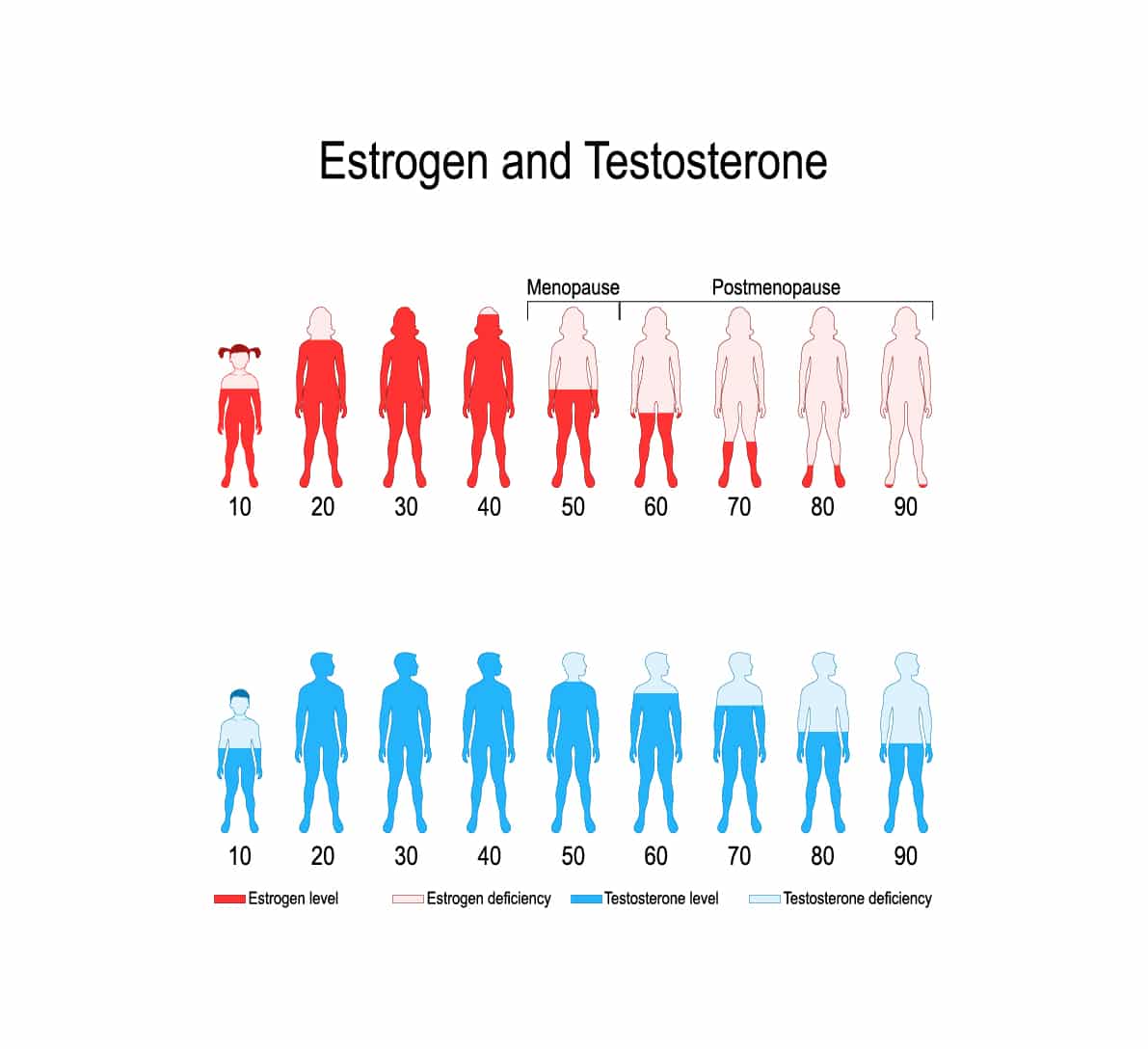As we age, our bodies naturally produce fewer hormones, which can cause unwanted changes for both women and men.
Dr. David Jayne provides hormone replacement therapy at his Edmond, OK, practice to safely counteract these effects.
What can bioidentical hormone replacement therapy (BHRT) do for me?
Understanding the Basics
Whether you have severe PMS, are approaching menopause, or even years past menopause, you may receive significant benefits from hormone therapy involving estrogen and other medications. Andropause, like menopause, affects aging males due to the reduction of the production of testosterone. Andropause is real and if you are past the age of 40 with any of these issues, you may benefit from BHRT. Hormone therapy helps replace the lack of hormones and libido associated with menopause and andropause.
Important Benefits
for Men and Women
Our practice in Edmond uses natural hormones to address:
Identify and Overcome Low Testosterone
Dr. Jayne discusses Low-T (low testosterone) in males and how testosterone therapy can be vitally important for a long, active, and productive life.
A Closer Look at Hormone Therapy
Hormones such as estrogen and testosterone are "signaling molecules" produced in the endocrine system, which includes the thyroid, pituitary gland, and pancreas. Hormones are also produced in the testes and ovaries. They affect functions such as metabolism, sexual function and fertility, growth, and even your mood.
Your body depends on a delicate balance of hormones. The smallest increase or decrease in the amount of estrogen, for example, can result in significant changes. The two points in most people's lives when the most significant hormonal changes occur are adolescence (puberty) and middle age (menopause and andropause).

Dr. Jayne only uses natural hormones for replacement therapy because synthetic hormones are associated with increased risks for problems. Hormone therapy at our practice in Edmond is tailored to each individual after an initial consultation where the medical history is reviewed and a pertinent examination is performed.
"An excellent doctor."
In the Edmond and Oklahoma City area
"Dr. David is an excellent Doctor. I've been seeing him for a couple of years, and has demonstrated his competence and care repeatedly with me. I recommend Dr. Jayne to anyone looking for a doctor. He always has the correct answer!"
Book Your Consultation
If you are suffering from the effects of changes in your hormonal balance due to the natural aging process, Dr. Jayne can help find a solution for your needs.
To request your hormone therapy appointment, send us a message online or call us at:

What to Expect during Treatment
To begin exploring your treatment options at our Edmond office, preliminary blood work is done, a follow-up visit is scheduled, and written information regarding BHRT is provided for your review prior to the follow-up. At the follow-up visit, lab values are reviewed and treatment recommendations are made with instructions for the proper administration of BHRT. Any questions you have regarding therapy can be answered at this time. Prescriptions are provided for local or mail-in pharmacies or a compounding pharmacy. Another visit is scheduled to monitor your response to therapy and will involve repeat lab testing to assure close monitoring.
Hormone Replacement Therapy for Women
Hormone replacement therapy is most commonly recommended after menopause and involves balancing estrogen, progesterone, testosterone, thyroid hormone, DHEA, and vitamin D. Balancing these factors can significantly improve several types of symptoms:
- Hot Flashes
- Mood Swings
- Vaginal Dryness
- Painful Intercourse
- Sleep Disturbances
- Fatigue
- Night Sweats
- Memory Problems
- Weight Gain
- Decreased Libido
- Skin and Hair Problems
- Irregular Periods
- Premenstrual Symptoms
- Changes in Breast Size
- Changes in Breast Shape
Hormone therapy may also help to decrease blood pressure and reduce plaque formation on the arterial walls, reduce the risk or the severity of type 2 diabetes (or both), reduce bone loss, reduce the risk of colorectal cancer and increase HDL (good cholesterol) while lowering LDL (bad cholesterol), and reduce the risk of Alzheimer’s dementia by raising estrogen levels.
During a consultation at his Edmond office, Dr. Jayne can determine the right amount of estrogen and other hormones, as well as vitamin supplements, to help you achieve your goals.

Hormone Replacement Therapy for Men
Reduced hormone levels in men may be associated with:
- Weakness
- Disturbed Sleep
- Osteoporosis
- Heart Disease
- Atherosclerosis
- Irritability
- Insomnia
- Impotence
- Low Testosterone
- Decreased Libido
- Slow Wound Healing
- Prostate problems
- Low Sperm Count
- Depression
- Anxiety
- Reduced Muscle Mass
- Memory Impairment
- Impaired Blood Cell Formation
- Reduced Cognitive Function
These effects are the result of a gradual drop in testosterone, DHEA, thyroid hormone, and vitamin D levels that start to substantially decline around age 40. Low testosterone can cause impotence, or erectile dysfunction. Balancing these hormones and vitamins will help significantly and may be associated with beneficial changes in fatigue, impotence, blood pressure, cholesterol, muscle mass, and bone density as well as helping to protect against heart disease, stroke, and Alzheimer’s disease.

Why Choose Us
To Treat Your Health Needs in Oklahoma City?
Holistic Approach
A lack of hormones can impact the entire body, which is why focusing on one section of the body at a time may not be effective for some patients. Dr. Jayne takes a holistic approach to your health and offers a custom blend of treatments in Edmond, OK, to find the right mix for you.
Personalized Care
Dr. Jayne creates personalized treatment plans for each patient to address all of their health issues and improve their quality of life. We understand that you want to feel better and get back to your daily life, which is why our patients spend no more than five minutes in the waiting room after checking in.
"Friendly and responsive."
"Before coming to Dr. Jayne I suffered from migraine headaches and low energy levels. The staff is friendly and responsive. I've been coming here for nearly 5 years and don't intend to stop."
Questions About Hormone Therapy?
Our Knowledgeable Staff Can Answer Them
While the actual method of treatment for hormone therapy can be as straightforward as taking a pill, the effects of hormones on our bodies can be hard to understand.
We want to make the entire process as transparent as possible for you. Dr. Jayne can answer any questions about hormone therapy during a consultation. Dr. Jayne will only recommend hormone therapy if it's the best solution for your case.
Request a consultation or call our office at:

Requirements & Other Considerations
Women wishing to undergo hormone therapy involving estrogen and other medications are required to have a current mammogram (within the past 12 months). This is important because two out of three instances of breast cancer test positive for estrogen or progesterone receptors. Under these circumstances, these hormones can actually accelerate the development of breast cancer. Your safety matters to us, and we want to take every measure to ensure that your treatment is as beneficial as possible. If you have not undergone a breast cancer screening in the last year, please do so prior to your consultation at our Edmond office.
We feel it is important to note that the National Institutes of Health concluded that taking estrogen alone does not increase the risk of breast cancer among those who have no family history of breast cancer and no benign breast diseases. However, the risk of breast cancer increases when taking estrogen in combination with progesterone. Dr. Jayne welcomes you to ask any questions you may have about the risk of breast cancer and other topics relating to hormone therapy during your consultation.
Men are required to have a current PSA blood test as well as a recent rectal exam completed within the last 12 months.



FAQs
I have not experienced any noticeable effects of menopause or andropause yet. Will I need to undergo hormone therapy eventually?
Not necessarily. Some men and women experience symptoms that are relatively mild, while others suffer more pronounced symptoms, such as disruptive hot flashes. If you begin experiencing symptoms that you feel are compromising your quality of life, schedule a consultation with Dr. Jayne and he can determine if hormone therapy is right for you.
Will my hormone therapy be ongoing for the rest of my life?
Most women undergo therapy involving estrogen or other hormones for three to five years, but some may require a longer course of treatment. It all depends on your individual needs, which Dr. Jayne will assess during a visit to our practice.
When will I see results?
It varies with every patient. However, many begin to notice positive changes within a few weeks, with the full extent of results becoming apparent within three to six months.
Are the hormones prescription-only?
Yes. The specific amount of hormones each patient needs must be carefully determined through testing, and there is no one-size-fits-all dose or combination of hormones. In fact, your prescription may be hand-made at a compounding pharmacy.
What is a compounding pharmacy?
Unlike an ordinary pharmacy, a compounding pharmacy can make customized medications to meet specific needs when the right medication is not commercially available. This service is important in hormone therapy because it allows doses to be tailored specifically to your hormone levels.
Will hormone therapy interact poorly with my other prescription medications?
In most cases, bad interactions only occur when your other prescriptions contain hormones. Birth control, for example, contains estrogen. During your appointment, you should be prepared to tell Dr. Jayne about all prescriptions you currently take so that he can determine a safe and effective solution for your needs.
"Amazing, Sweet, and Professional"
What Patients Have to Say About Our Practice in Edmond, OK
"I went in for peptide treatment. The staff is nice and Dr. Jayne is really knowledgeable and didn't try to force me into any treatments. I would definitely recommend them to people"
"I was seen last minute by Dr. Jayne. He was amazing! Plus the staff was so sweet and professional. I'm so grateful 🙏."

A Family Physician
Treating the Mind & Body
Dr. David Jayne
Dr. David Jayne uses modalities including medical acupuncture, hypnotherapy, hormone replacement therapy, and traditional Western medicine to treat both the mind and body.
Dr. Jayne:
- Is a graduate of the University of Oklahoma College of Medicine
- Is a board-certified family physician
- Has been practicing in Edmond for over 20 years
To book a consultation, please send us a message online or call us at 405-348-8850 .


